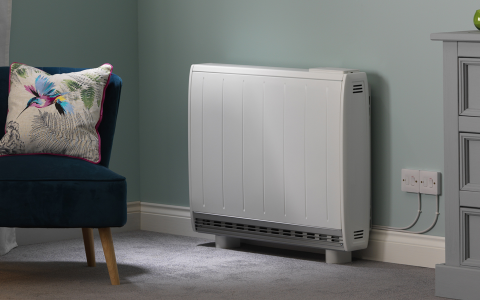Buying Guides
Our experts have put together the top things to consider for each of our product ranges. Helping you choose the best product for you and your family.
Portable Heating
Dehumidifiers
Air Purifiers
Cooling fans
Sustainability
Sustainability plays a key role in the future of Dimplex. We believe it's our moral responsibility to do what we can for future generations.
How to specify the right heat pump for your residential project: Environmental and planning concerns
Heat pumps are being increasingly specified for residential projects to meet hot water and space heating demands. They provide a low carbon alternative to the use of fossil fuels as an energy source and can achieve compliance to Part L 2021, the latest building regulations update to the approved document covering the conservation of fuel and power. The government is proposing further changes to building regulations in 2025 in the form of the Future Homes Standard that will prohibit the use of fossil fuels for new residential buildings. Therefore, specifying heat pumps now will help to future proof specifications and minimise the need for retrofitting to meet further regulatory changes.
How can increased ventilation rates and improved filtration help deliver better Indoor Air Quality (IAQ) in residential buildings?
It is an accepted view, supported by the World Health Organisation (WHO), that increased ventilation and better filtration rates significantly improve the IAQ of our buildings. Increasing the airflow in an indoor space and removing pollutants and contaminants such as particulate matter and gases through filtration, can provide considerable health and wellbeing benefits to its occupants.

We are Dimplex
Dimplex announces brand endorsements

Spring Clean for a Healthier Happier Home in Spring 2024
Spring is officially here! Even though it comes with a mixed bag of seasonal weather, one thing is certain: longer days and warmer temperatures are on their way. As the spring flowers bloom, returning some much-needed colour to our parks and public spaces, people often mark the change of the seasons with some spring cleaning.

Dimplex to exhibit product showcase at InstallerSHOW 2024 Stand H90
Dimplex has announced it will be exhibiting at InstallerSHOW 2024 on stand H90 between 25th-27th of June.

What are the radiator surface temperature regulations for schools and nurseries?
In this FAQ we look at the regulations covering schools and nurseries that define the maximum safe surface temperature of radiators. The regulations require specifiers and asset managers to select radiators that can operate with a low outer surface temperature to achieve compliance.

What should be considered when replacing a panel heater?
In this FAQ we explore some of the practical measures that can be taken to help make the job of replacing old panel heaters easier. We also show how gaining an understanding of the many features that are available on modern panel heaters will help decide which best suits the requirements of the building and its occupiers.

What is a low surface temperature (LSTE) panel heater?
In this FAQ we look at low surface temperature (LST) radiators to see what they are and why their specification is required in sectors such as education and healthcare.

Which panel heater is best for student accommodation and why?
In student accommodation, there are patterns of occupancy and behaviour that can lead to wasted heat and higher energy costs. Keeping energy use in check is vital for the providers of student accommodation and choosing the right panel heater with intelligent controls can help minimise heating costs.

IP ratings for electric radiators and why they matter
What are the IP ratings for electric radiators and why do they matter?
IP ratings indicate how well the enclosure around a device such as an electric radiator or a panel heater, will protect the internal mechanical and electrical components from the ingress of solids and liquids. Intrusion into an electric radiator by fingers, foreign objects of various diameters, or water could pose a hazard to the user and risk damaging the product.

What is the difference between radiant heat and convection heat for an electric radiator?
The source of the warmth felt from an electric radiator can either come from radiant heat or convection heat and sometimes a combination of both. However, what is the difference between those heat types and how do modern electric radiators utilise them to deliver heat in the most appropriate and efficient manner?

Dimplex Launches Alta Wi-Fi Panel Heaters
Introducing Alta Wi-Fi, a slimline, wall mounted panel heater from Dimplex. Replacing Monterey, Girona and Saletto, Alta Wi-Fi offers a more lightweight, Scandinavian-inspired design with a range of stylish clip-on glass accessories (sold separately) making it the ideal space heating system for building projects where space saving and aesthetics are key.











